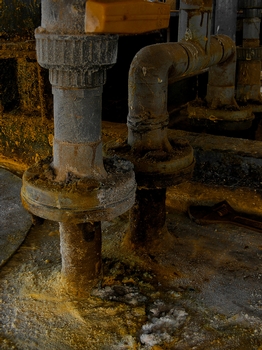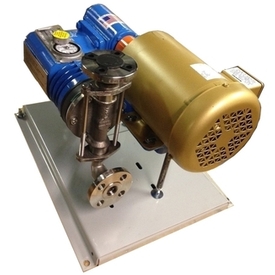The reasons for clean and neutral water are vast, stemming from human health to piping and equipment durability. Chemicals like Sulfuric Acid, Phosphoric Acid, Nitric Acid, among others are all used to help maintain PH levels in water. This article will go over why PH balance in water treatment is important and the needed safety measures in your pump design for handling the chemicals that are commonly used to treat water.
Wastewater Treatment
When dealing with wastewater in larger industrial plants or city applications, a lot of attention goes towards separating sediment, dissolved solids, and other impurities from the water.
 |
| Rusty pipes due to untreated water |
Polymers are used as coagulating agents to assist in this process.
But often times acids are needed in the wastewater treatment process too. After the separation stages, but before one is able to send the water back into the environment, usually a river, the water needs to have a neutral PH. Imagine dumping “clean” (as in no sludge) water back into a river that had a PH balance of 11 or 12… not good for the fish.
A chemical metering pump consistently dosing sulfuric acid, or another acid, is a solution to this issue. Sulfuric acid is the answer to help maintain a healthy PH balance in your water processes where high alkalinity is an issue. High alkalinity means very basic, or high in PH.
It isn’t often seen as such, but dosing pumps injecting strong chemicals into water can actually be very environmentally friendly.
General Water Treatment
As for water treatment in general, the main reasons for treating water is for safety in drinking water and preventative maintenance in piping and process equipment. These two issues often go hand in hand. Poor piping conditions can lead to poor drinking water conditions.
For example, in Flint Michigan, water was not being treated with anti-corrosive agents for a period of almost two years. According to the CNN article “How tap water became toxic in Flint, Michigan”, the untreated, corrosive water began eroding iron water mains which turned the water brown and toxic. It later even lead to high levels of lead in the drinking water. If you want to learn more about metering pumps use for safe drinking water, check out this excellent article written by Tom O’Donnell on Water World’s website, “CONSIDERATIONS IN CHOOSING A METERING PUMP FOR WATER TREATMENT”.
So it isn’t always simply killing dangerous bacteria in drinking water. Maintaining a neutral PH balance with acids and anti-corrosion agents plays a big role in safe drinking water.
With industrial processes involving water, simply put it becomes about efficiency. Untreated water that becomes high in alkalinity corrodes piping and other equipment. The more corrosion and scale buildup in your processes, the less efficient the water is being used.
Take industrial steam boilers as an example. These not only use chemical metering pumps to treat the water they boil, but they also continuously and intermittently flush water from the boiler all in an attempt to have close to 100% clean water which would in theory lead to 100% steam generation. Corrosion and scale build up in boilers can act as insulation, keeping the heat generated from the fire tubes from transferring efficiently to the water.
With industrial processes, clean water is about saving you money.
Chemical Metering Pumps for Acids
When it comes to the chemical dosing process of injecting acids into an application, two main things should come to mind:
 |
| Madden popular MF series acid dosing pump |
- Do I have a chemical metering pump designed to safely and durably handle these chemicals?
- Am I saving money where I can? Pumping acids and other chemicals is a costly and reoccurring expense.
While treating water with acids does neutralize and ultimately makes the water safer in many different ways, before it enters the water, acids like Sulfuric Acid, can be quite dangerous and corrosive themselves. Not only is it harmful to the touch, burning human skin, but there aren’t many rubbers, metals, or plastics that can handle this corrosive chemical either.
Designing a chemical dosing pump to safely handle an acid is important. Madden Pump would suggest designing your next Acid pump as follows:
- Use a stroking type positive displacement pump to ensure accurate and consistent dosing.
- Use a Teflon solution head/wetted end. Teflon and/or Kynar are some of the best plastics available to handle dangerous and corrosive chemicals.
- Use a double diaphragm set up for added Safety. Using a Primary Viton diaphragm and a backup diaphragm allows you the added security of keeping liquid out of your pump when and if the primary diaphragm wears out, saving you money. It also allows, in Madden chemical dosing pump design, for the use of a leak detecting pressure switch. In the case of primary diaphragm fatigue, the switch would activate sounding an alarm or shutting off the pump entirely.
- Use Teflon valve parts and balls. Hastelloy C and Ceramic balls are good for some acids as well.
When it comes to saving money, it’s all about accuracy and consistency. Chemical injection pumps not designed to pump the exact same amount of acid with each and every stroke may be wasting chemicals by pumping too much into your process. Not only can that be harmful to the process, process equipment, and the environment, but wasting chemicals is directly wasting money.
An industrial grade metering pump like Madden Pump’s can help ensure you only dose the exact amount of acid you need. All day long, all week long, and all year long. The same amount with every stroke.
Conclusion
Dangerous and corrosive chemicals like the acids mentioned in this article can be a big help to wastewater and water treatment applications, but they can also be quite hazardous to human skin and process equipment all while being a costly operation.
Don’t settle for just any pump that might mention it can handle acid pumping. These statements can be misleading as they can be referring to non-corrosive acids, like lower concentrations of Lime for example.
Madden Pump’s diaphragm metering pump is designed to pump acids 24/7/365 with little to no downtime. Our simple, rugged design offers safety and cost savings in your water treatment applications.
